Features
You are here
Doug Ford vs the climate

April 24, 2018
“Carbon tax is a terrible, terrible tax. I don’t even know why they put the word carbon in front of it. I don’t. It’s just a tax. A tax is a tax,” said Doug Ford to a group of conservatives in Ottawa in March. As he later explained, “I’m excited for my friend Jason Kenney to get elected [in Alberta], at least we’ll be on [the same] side…If we have to [take the matter to court], we have to do it. We’ll do whatever it takes to make sure our businesses are competitive.”
Carbon tax contradictions
Ford can grab on to the argument that the carbon tax is just “tax and grab” and he’d be right—as long as there is no requirement for revenues to go to clean energy investment and refunds to low and middle income people. Unless carefully designed, carbon taxes can act as a flat tax, unduly penalizing low wage workers.
Despite Ford’s ranting, carbon taxing is most favoured by business (just like it supports “basic income”), because this tax is the least likely to quickly, if ever, bring us to a fossil-free future. The various tax or cap-and-trade programs do not make the taxes nearly high enough to reduce emissions sufficiently to ward off climate catastrophe.
This comes at a time when Earth’s planetary boundaries continue to be breached whether we are talking about hotter climate, ocean acidification, decreased biodiversity or any of a host of indicators that measure how habitable our planet is for humans and animals. Notwithstanding the increased use of renewable energy and divestment from fossil fuels by some major financial institutions, the use of fossil fuels also continues to increase globally—which is already disastrous for Indigenous communities whose territories are poisoned by tar sands extraction, or migrants displaced by climate disasters.
By seizing on the shortcomings of the carbon tax, Ford is trying to turn the anger at Liberal austerity against the climate justice movement. So far the Tories have yet to say anything about addressing the climate in any meaningful way, not even to say how they will make up the $4 billion shortfall resulting from not implementing carbon taxes. And Ford's threat to stop the $15/hr minimum wage would disproportionally impact Indigenous and migrant workers who are most impacted by climate disasters and most concentrated in low wage jobs.
Climate justice: during the election and beyond
But climate justice activists will not be letting Ford or any other politician off the hook. Plans are underway for a climate justice contingent in the June 16 post-election rally called by the Fight for $15 and Fairness Campaign and the Ontario Federation of Labour.
The Toronto Good Jobs For All coalition (made up of labour, environmental and social justice organizations) is developing a climate manifesto. An early version calls for any carbon tax to be made conditional upon the requirement that refunds go to people on low and moderate incomes, and other revenues go to furthering actions to reduce greenhouse gas emissions. Other calls are for more investment in rapid transit, stopping the privatization of Hydro One, retrofitting buildings, reforestation, a just transition for workers, mandatory joint union/management for workplace environmental representatives, and Community Benefit Agreements with binding and equitable employment targets for major infrastructure projects.
Toronto 350 makes similar demands and adds support for low-carbon jobs including a minimum wage increase and enforcement of the Fair Workplaces and Better Jobs Act (Bill 148) to recognize the important role low-carbon jobs—particularly in health, education and social services—play in our economy and the lives of working people.
We must push the NDP provincially (and federally) to endorse and act upon the Leap Manifesto. The NDP should challenge Ford’s contempt for climate justice, expose the Liberals’ shortcomings and demand real climate justice alternatives. We can stop fossil fuel use by ensuring a just transition for fossil fuel workers, while expanding and raising the wages of low carbon economy. To push this we need to build the climate justice movement so that it is truly a mass movement, involving high and low carbon workers fighting for change. The next step in Ontario is to build the biggest possible June 16 rally regardless of who wins the election, raising climate justice demands during the election and beyond.
Register now for Join the Resistance: Marxism 2018, a two-day conference April 27-28 in Toronto, including the sessions “Indigenous sovereignty and Trudeau’s fake reconciliation,” “Climate change and socialism: facing the anthropocene,” and “NDP, socialists and elections”
Section:










